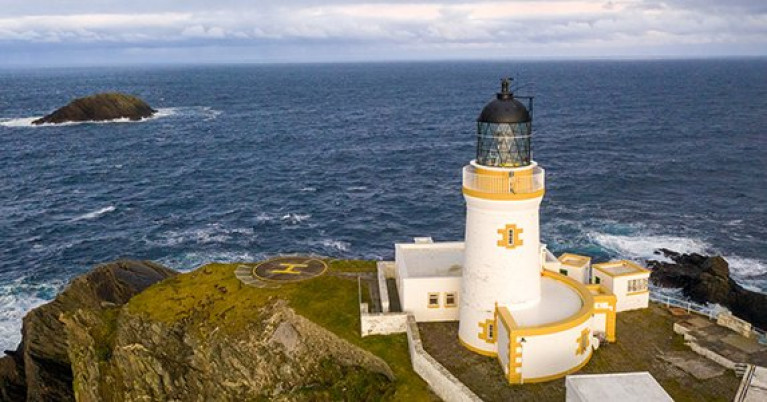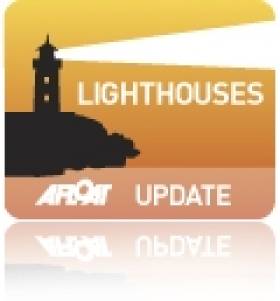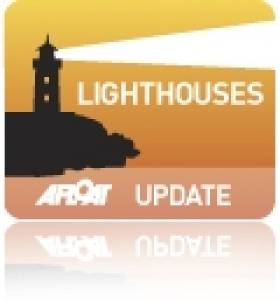Displaying items by tag: Northern Lighthouse Board
In Scotland lighthouse workers today, 27 July, are to take part in a second wave of industrial action in a long-running dispute over pay with the Northern Lighthouse Board (NLB).
The union UNITE has confirmed that its NLB members will resume a 24-hour strike today, this follows previous strike-action which took place last month.
As ITV News reports approximately 40 members of UNITE, including able seamen, base assistants, cooks and technicians will walk out with pickets in place at Oban. This is where NLB's marine operations depot in located in west Scotland along as the homeport for both their aids to navigation vessels are based.
The strike-action will run throughout the day and end tomorrow, 28 July at noon and the dispute follows a previous 24-hour stoppage which took place in late June.
Workers of the NLB which maintain navigational buoys and lighthouses for the safety of shipping in Scottish waters, voted in April to take the first strike action in the board’s 247-year history.
The strike took place after workers were offered a 2% pay rise amid double-digit inflation.
General secretary of UNITE, Sharon Graham said: “At the heart of this dispute is an unacceptable 2% pay offer which does absolutely nothing to help keep families and households afloat during the worst cost of living crisis in a generation".
More on the strike-action here at the General Lighthouse Authority (GLA) for Scotland and the Isle Man, see Afloat's rail related coverage yesterday on GLA's in the UK and Ireland.
In the seas of Scotland and the Isle of Man, safety could be “compromised” after lighthouse workers voted for strike action amid a dispute over pay.
Members of the Unite the Union, commonly known as Unite, carried out a ballot with those employed by the Northern Lighthouse Board (NLB) in which 90.6% voted for strikes out of a 85% turnout.
The NLB is the General Lighthouse Authority (GLA) which is responsible for maintaining aids to navigation in Scottish and Manx waters. Such vital duties requires two Northern Lighthouse Vessels (NLV) which are based in Oban on the west coast.
As reported earlier this month, around 30 members of the union, including those working on the NLV's involving able seamen, base assistants, cooks and technicians have launched their support behind the action.
According to Unite, the NLB has offered a 2% rise following a pay freeze last year which the union branded as “insulting”. They described it as a substantial real-terms pay cut over two years.
Unite added that its members working for NLB, provide vital maintenance and operational support for more than the 200 lighthouses, beacons and buoys.
This important work is to ensure that mariners on ships and vessels have safe passage in some .
In addition to the lighthouse tenders, NLV Pharos and NLV Pole Star based in Oban, this is where technical operations are also carried out and in Edinburgh is located the headquarters of the GLA service.
STV News has more details on the pay dispute.
Major Refurbishment for Northern Lighthouse Board HQ in Edinburgh and Careers Show in Glasgow to Offer Apprenticeships
The Northern Lighthouse Board, the General Lighthouse Authority (GLA) for Scotland and the Isle of Man, is based in Edinburgh where the headquarters of the GLA is undergoing a major refurbishment.
Located at 84 George Street, the headquarters of the Northern Lighthouse Board has been at this site since 1832, though the NLB has been in existance since 1786.
From this headquarter building in the Scottish capital, the famous Stevenson family of engineers led the world in the advancement of lighthouse technology. That tradition continues today with the NLB team caring for lighthouses, buoys, beacons and radio aids to navigation to protect mariners.
Mike Bullock, Chief Executive of the Northern Lighthouse Board said: “The building is having its ageing electrical systems replaced and we are taking the opportunity to make it greener, with better office and welfare facilities, which will provide working conditions fit for the 21st Century. This will allow us to continue with what we do best – keeping people and the environment safe from harm.”
Northern Lighthouse Board to attend Careers Show, Glasgow
Afloat highlights that the NLB is to attend The National School and College Leavers Show held at the Scottish Exhibition Centre, Glasgow.
The dates for the show are Tuesday 28 March (10:00-14:30) & (15:30-18:00) and Wednesday 29 March 10:00-14:00
About the NLB
The NLB operate and maintain 208 lighthouses and 174 buoys as well as providing radio aids to navigation (AtoN) in the waters of Scotland and the Isle of Man.
This requires the NLB to operate two ships, the NLV Pharos which as Afloat reported last summer made a rare port of call to the Manx capital where the public boarded for an 'Open Day' to explain the work of the GLA. The event was marked by the ship 'dressed overall'.
The second vessel, NLV Pole Star as Afloat also reported is to be replaced with a newbuild of the same name by 2025.
The current ships carry out buoy work, deliver stores and supplies to lighthouses and inspect navigation aids on oil and gas rigs in the Scottish sector.
We employ a fantastic team of engineers, technicians, retained lighthouse keepers, seafarers and support staff. We also offer Deck Rating and Engineering apprenticeships.
Together our team ensures that our lighthouses, buoys and beacons continue to evolve to meet the changing requirements of the mariner.
Come and meet the team and find out about future career opportunities.
For further information on the Careers show, click HERE.
Isle of Man Department Submits Plans to Extend Douglas Harbour's King Edward VIII Pier
The Isle of Man Government's Department of Infrastructure wants to build a dolphin and footbridge in Douglas Harbour.
As Manx Radio reports, plans have been published to extend one of the harbour's piers used by ferry operator, the IOM Steam Packet Company.
The DoI has submitted a planning application for a marine dolphin and footbridge on King Edward VIII Pier.
The application says the scheme would include installing a mooring platform and bollard, as well as additional work not included in the plans as it would not need approval by the planning board.
The site is in a high-risk flood zone, but the department says it has not carried out a flood risk assessment as the structure will be founded in the seabed.
Dick Welsh Appointed as New Isle of Man Commissioner for the Northern Lighthouse Board
Dick Welsh has been appointed as the new Isle of Man Commissioner (Non-Executive Director) of the Northern Lighthouse Board, the General Lighthouse Authority responsible for Scotland and Manx waters.
Mr Welsh, who received an MBE in the January 2020 Honours List for services to the maritime community on the Isle of Man and Worldwide, will serve for a three-year term, from 1 June 2022 to 31 May 2025.
Mike Bullock, Chief Executive of the Northern Lighthouse Board said: “We are really looking forward to welcoming Dick to NLB. From a Merchant Navy Cadetship to a serving Engineer Officer and latterly as Director of the Isle of Man Ship Register, Dick’s impressive career at sea and in senior roles ashore means he will be a tremendous addition to our Board of Commissioners.
“This is a unique role which offers the opportunity to contribute to the strategic leadership and governance of NLB, in the delivery of a critical safety service to all mariners.”
Commenting on his appointment with NLB, Dick Welsh said: “I am incredibly fortunate to be appointed as Commissioner, Isle of Man for the Northern Lighthouse Board. I am really looking forward to getting involved and becoming a valuable member of the Board.
“I have had a long association with NLB lights. As a boy I spent summers at Langness where a family friend had been a keeper. This association went further when I dated a Langness keeper's daughter. When he was posted to Muckle Flugga, I spent 3 glorious weeks there one summer and visited the lighthouse. Even today I often spend time at Langness, Point of Ayre or fishing inside Chicken’s Rock.”
As a Commissioner, Mr Welsh will help provide non-executive leadership, challenge, oversight and support to the executive team through regular Board and committee meetings as well as participating in visits to NLB’s operational sites across Scotland and the Isle of Man.
The appointment will take effect from 1 June 2022.
Northern Lighthouse Board Is Announced as Finalist in 'Working Families Best Practice Awards'
The Northern Lighthouse Board which is responsible for the waters surrounding Scotland and the Isle of Man, has been named as a finalist in the Working Families Best Practice Awards.
The NLB has been shortlisted in the category Best for Mental Health & Wellbeing. The awards celebrate employers whose stand-out cultures and working practices are leading the way in flexible and employee-friendly workplaces.
Mike Bullock, Chief Executive of the Northern Lighthouse Board said: “It is a huge honour to have been shortlisted for this award. Our people are the most precious and important asset we have, and our aim is to provide a supportive and healthy working environment to allow every member of NLB’s team to thrive.”
The other finalists in the category are Arnold Clark and Santander.
The winners will be announced at an awards event at Vintner’s Hall in London on 8 June 2022, with the official event partner Bright Horizons Work+Family Solutions.
Northern Lights Scottish Star Set South to Homeport of Irish Lights
#PoleStar – Northern Lighthouse Board's aids to navigation tender NLB Pole Star which normally serves in Scottish waters and also has responsibility for the Isle of Man, made a brief call to Dun Laoghaire Harbour over the weekend, writes Jehan Ashmore.
The presence of Pole Star in Irish waters is not unusual as on occasions, operations require the deployment of these specialist ships between the three General Lighthouse Authority (GLA).
The GLA are the Commissioners of Irish Lights, Northern Lighthouse Board and Trinity House which works in English and Walsh waters and those of the Channel Islands.
During Pole Star's overnight Friday-Saturday call to Dun Laoghaire, the harbour is where CIL are headquartered and is also the homeport of ILV Granuaile, which is understood to be at Cork Dockyard.
As Afloat.ie previously reported, she underwent last year a '15 year Special Survey Dry-docking' awarded to the Rushbrooke based facility that beat off stiff competition from other European yards.
At this stage, it is uncertain if the call to Cork (or for layover period?) was directly to do with the deployment of Pole Star. The vessel departed the Dublin Bay harbour yesterday for Belfast Lough and today headed up the Firth of Clyde bound for Greenock.
Pole Star (2000/1,174grt) the smaller of the two NLB vessels, is otherwise an Oban based buoy-laying vessel which can also carry out hydrographic surveys.
Combined, the GLA's have a fleet of six ships in which CIL's ILV Granuaile built also in 2000, was the first in terms of ship design of the lighthouse umbrella organisation to have her working deck positioned aft. i.e. at the back of the ship where buoys are stowed to and from deployment.
At the time of Granuaile's introduction, this far improved design was followed suit by her GLA counterparts. However, Trinity House's THV Patricia, dating from 1982, remains as the sole survivor of the traditional forward located working deck arrangement between the superstructure and bow.
Notably, she is the only tender to accommodate paying-passengers (numbering 12) who can join the vessel as she carries out her routine duties.
Hard-Working Vessels Keep Lights Switched-On
Sailing was not the only activity that took place in Dublin Bay last Saturday as the Northern Lighthouse Board's (NLB) multi-function tender NLV Pharos was busy at work, writes Jehan Ashmore.
The NLB is the Scottish equivalent of the Commissioners of Irish Lights (CIL) and it is not unusual for such vessels to share work duties beyond their respective jurisdictions. The 84m NLV Pharos is equipped with dynamic positioning and a 30-tonne main crane on her 300m2 aft-deck.
Overall she is similar in appearance to Irish lights ILV Granuaile which is based out of Dun Laoghaire. The Irish Lights tender built in Romania in 2000 tends to operate more often off the west coast during the summer months due to the more favourable weather conditions.
The 1,300 (dwt) deadweight tonnes NLV Pharos yesterday returned to her base in Oban from her Irish duties. The west coast base was established in 1904 and is also homeport to the service's smaller NLV Pole Star which is equipped with an 18-tonne crane on her 90m2 aft deck.
The facility in 2000 underwent a £4.2 million redevelopment to turn a buoy yard into a multi functional support base which is computer-linked to the NLB headquarters in Edinburgh.
In addition Trinity House which maintains the service for England and Wales operate the tenders THV Galtea,THV Patricia and the fast-response craft THV Alert from their base in Harwich.
Trinity House forms the trio of the General Lighthouse Authorities (GLA) alongside NLB and CIL. Each member of the GLA co-operate in the allocation of vessel-tender deployment.
Asides the varied and critical role of the tasks performed by the GLA's tenders, they are also available for charter to third parties. Between them the tenders can conduct buoy and chain work, search and rescue, lighthouse re-fuelling, salvage and recovery, towing, hydrographic applications and ROV work.































































